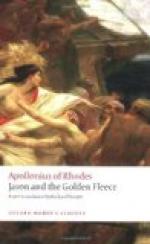Thus spake Aeetes; and on that same day the Colchians launched their ships and cast the tackle on board, and on that same day sailed forth on the sea; thou wouldst not say so mighty a host was a fleet of ships, but that a countless flight of birds, swarm on swarm, was clamouring over the sea.
Swiftly the wind blew, as the goddess Hera planned, so that most quickly Aeaean Medea might reach the Pelasgian land, a bane to the house of Pelias, and on the third morn they bound the ship’s stern cables to the shores of the Paphlagonians, at the mouth of the river Halys. For Medea bade them land and propitiate Hecate with sacrifice. Now all that the maiden prepared for offering the sacrifice may no man know, and may my soul not urge me to sing thereof. Awe restrains my lips, yet from that time the altar which the heroes raised on the beach to the goddess remains till now, a sight to men of a later day.
And straightway Aeson’s son and the rest of the heroes bethought them of Phineus, how that he had said that their course from Aea should be different, but to all alike his meaning was dim. Then Argus spake, and they eagerly hearkened:
“We go to Orchomenus, whither that unerring seer, whom ye met aforetime, foretold your voyage. For there is another course, signified by those priests of the immortal gods, who have sprung from Tritonian Thebes. As yet all the stars that wheel in the heaven were not, nor yet, though one should inquire, could aught be heard of the sacred race of the Danai. Apidanean Arcadians alone existed, Arcadians who lived even before the moon, it is said, eating acorns on the hills; nor at that time was the Pelasgian land ruled by the glorious sons of Deucalion, in the days when Egypt, mother of men of an older time, was called the fertile Morning-land, and the river fair-flowing Triton, by which all the Morning-land is watered; and never does the rain from Zeus moisten the earth; but from the flooding of the river abundant crops spring up. From this land, it is said, a king[1] made his way all round through the whole of Europe and Asia, trusting in the might and strength and courage of his people; and countless cities did he found wherever he came, whereof some are still inhabited and some not; many an age hath passed since then. But Aea abides unshaken even now and the sons of those men whom that king settled to dwell in Aea. They preserve the writings of their fathers, graven on pillars, whereon are marked all the ways and the limits of sea and land as ye journey on all sides round. There is a river, the uttermost horn of Ocean, broad and exceeding deep, that a merchant ship may traverse; they call it Ister and have marked it far off; and for a while it cleaves the boundless tilth alone in one stream; for beyond the blasts of the north wind, far off in the Rhipaean mountains, its springs burst forth with a roar. But when it enters the boundaries of the Thracians and Scythians, here, dividing its stream into two, it sends its waters partly into the Ionian sea,[2] and partly to the south into a deep gulf that bends upwards from the Trinacrian sea, that sea which lies along your land, if indeed Achelous flows forth from your land.”




